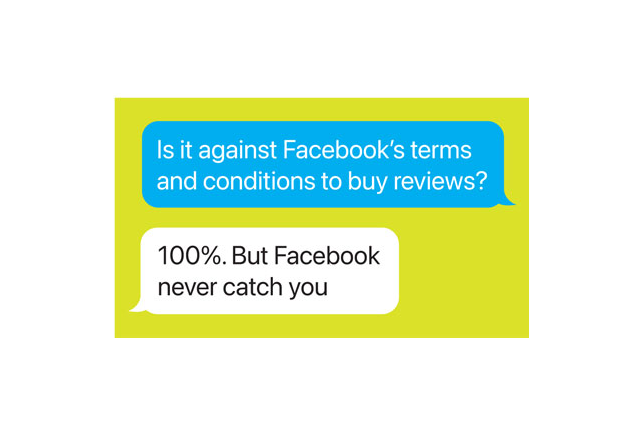Consumer services firm Which? conducted a study to identify how good Facebook, Google, and Trustpilot are at filtering out fake reviews.
The answer, in a quick nutshell, is not all that good. Great, that’s the article, everyone can go home now, thank you and goodbye! No, but really, stay because the algorithm needs readers and I need a job. It’s been a kept secret that there are entire firms and small businesses dedicated to generating fake reviews for people or places on review sites, making fake IDs to help bolster an account’s followers, and so on. Such activities range from mildly annoying to ridiculously obnoxious, especially when someone’s trying to figure out a new place to eat.
There are no more gauging reviews, there’s gauging the authenticity of reviews, and only then can one make a decision. It’s quite frankly annoying, and Which?, a U.K.-based consumer services business, agrees. That’s why it decided to conduct a test of sorts to Undercover Boss the whole situation and see just how far down the problem roots itself.
What I mean by to Undercover Boss a situation is that Which? decided to pose as a business online, hire a review-generating firm to make up fake reviews for its brand, and then attempt to see whether any action is taken against either the reviews or themselves by Facebook, Google, or Trustpilot. The brand that it went by is Gold Lion Labs – a COVID PCR testing service, whose website you can still find online. It’s got solid SEO since the website shows up right at the top. The review broker, Xealme, has had a history of creating a total of 16,000 reviews for 570 customers, so it seemed like the right firm for the gig.
On Facebook, Golden Lion Labs suddenly had 19 five-star reviews, which were promptly reported as being fake to the platform. However, Facebook in response removed 18 of the fake profiles and took a literal month to gauge out the rest of the reviews. Naturally, upon being exposed as such, spokespeople from Facebook stated that they were investigating the problem. Of the three review sites that were tested, Which? reported Facebook as being the tardiest in response and action.
Trustpilot and Google review also amassed a total of 19 fake five-star reviews, although the reviews were issued over a relatively long period, and were (mostly) removed after reporting. Finally, to conclude the study entirely, Which? issued a Cease and Desist letter against Xealme, stopping the business dead in its tracks.
Read next: We’d Need Five Earths if Everyone Lived Like Americans, How Do Other Nations Stack Up?
The answer, in a quick nutshell, is not all that good. Great, that’s the article, everyone can go home now, thank you and goodbye! No, but really, stay because the algorithm needs readers and I need a job. It’s been a kept secret that there are entire firms and small businesses dedicated to generating fake reviews for people or places on review sites, making fake IDs to help bolster an account’s followers, and so on. Such activities range from mildly annoying to ridiculously obnoxious, especially when someone’s trying to figure out a new place to eat.
There are no more gauging reviews, there’s gauging the authenticity of reviews, and only then can one make a decision. It’s quite frankly annoying, and Which?, a U.K.-based consumer services business, agrees. That’s why it decided to conduct a test of sorts to Undercover Boss the whole situation and see just how far down the problem roots itself.
What I mean by to Undercover Boss a situation is that Which? decided to pose as a business online, hire a review-generating firm to make up fake reviews for its brand, and then attempt to see whether any action is taken against either the reviews or themselves by Facebook, Google, or Trustpilot. The brand that it went by is Gold Lion Labs – a COVID PCR testing service, whose website you can still find online. It’s got solid SEO since the website shows up right at the top. The review broker, Xealme, has had a history of creating a total of 16,000 reviews for 570 customers, so it seemed like the right firm for the gig.
On Facebook, Golden Lion Labs suddenly had 19 five-star reviews, which were promptly reported as being fake to the platform. However, Facebook in response removed 18 of the fake profiles and took a literal month to gauge out the rest of the reviews. Naturally, upon being exposed as such, spokespeople from Facebook stated that they were investigating the problem. Of the three review sites that were tested, Which? reported Facebook as being the tardiest in response and action.
Trustpilot and Google review also amassed a total of 19 fake five-star reviews, although the reviews were issued over a relatively long period, and were (mostly) removed after reporting. Finally, to conclude the study entirely, Which? issued a Cease and Desist letter against Xealme, stopping the business dead in its tracks.
Read next: We’d Need Five Earths if Everyone Lived Like Americans, How Do Other Nations Stack Up?

